Two cunning Napoleons who invented Italy
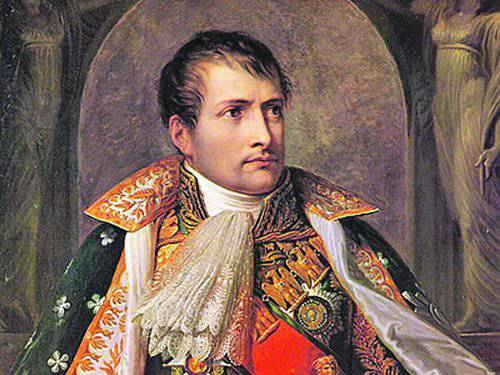
In Italy, they like to erect monuments to King Victor Emmanuel. Officially, he is the unifier of the country. Along with Count Cavour and Garibaldi, this king is one of the three main characters of the national myth. The myth is in Italian bravura name - Risorgimento. Translated - Resurrection. If you reduce this tale to a simple formula, it looks like this: in the XIX century, Italy suffered under the heel of foreign conquerors, and the Italians dreamed of liberation and the re-establishment of a single country - the Resurrection. The brave king of Piedmont, Victor Emmanuel, appeared and, with the help of the wise prime minister, Count Cavour, freed her from the dominion of the Austrians. Hail Restored Italy!
In our version, this political tale spawned a myth about the “Ukrainian Piedmont”, which Professor Hrushevsky “discovered” in Galicia. But the truth is that the first person to draw the kingdom of Italy on the map was not Victor Emmanuel in 1861, but Napoleon Bonaparte in 1805. He also became the first king of Italy. And in the time of Victor Emmanuel, it was not the Italians who shed the most blood for the independence of this country, but ... the French.
This article is about the technology of creating a nation and national mythology. What is happening in Ukraine today is not unique - just the last dying wave of the process that began in Europe in the era of the French Revolution. The creators of nations in the West lied no less than our "fathers" of independence. But the parallels between Italy and Ukraine are especially obvious. And that, and another country made literally out of nothing - “recreating” something that never happened.
"We need to create Italians." There is the famous phrase of the same Count Camillo di Cavour, said in 1861 year: "We created Italy, now Italians need to be created." Unlike Ukrainian politicians, Cavour was a cheerful guy who loves wine and women. He did not lie unnecessarily. At least yourself. Until the beginning of the XIX century, Italy - just a geographical concept. Dante and Benvenuto Cellini considered themselves Florentines, Casanova - Venetian, Columbus - Genoese. None of them called themselves Italians. What could the Venetians have in common with the Genoese, if they spoke different languages and hated each other most of all? The brutal wars between Genoa and Venice are the main conflict of the Middle Ages in Italy. The Venetian Marco Polo wrote his book about the journey to the East while sitting in a Genoese prison. A single literary language did not exist. Memoirs, which brought him worldwide fame, the same Casanova wrote in French. His compatriot, an outstanding erotic poet Baffo, composed in the Venetian language. Any philologist knows Dante’s lines:
Be proud, Fiorenza, with great glory!
You are above the ground and the sea beating the wing,
And your hell is filled with glory ...
And not a word about Italy! For Dante, the birthplace is Florence, Fiorenza. He was mentally addressed to her, expelled from his native city as a representative of the defeated party of the Ghibellines, supporters of the German emperor. Dante believed: one God in heaven, therefore, one king must be on earth. And in the treatise "Monarchy", where he expounded his thoughts, the poet turned to the "peoples of Italy". Notice the people, not the people.
This continued until the day when, in 1796, a young French general of Corsican origin, Napoleon Bonaparte, invaded Italy. On the eve of his invasion of Italy, there were many states: the Neapolitan kingdom, which occupied almost half of present-day Italy, the Kingdom of Sardinia, several duchies - Modena, Parma, Tuscany, the Papal States with its capital in Rome and two republics - Genoa and Venice.
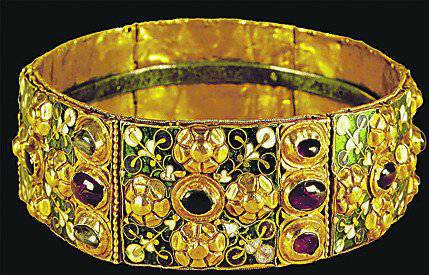
All this bad lay Bonaparte won over several months. And then he created in the ruins of the Italian Republic, so that it was easier to manage the captured territories. In those days, a young adventurer was still a Republican. But in 1805, Napoleon declared himself emperor, and renamed the Italian Republic the Italian kingdom. The king of Italy naturally appointed himself. And he was crowned with the iron crown of the Lombards. This crown belonged to the leaders of a medieval Germanic tribe that seized in the 6th century AD. er northern italy. The crown is, in fact, golden. But inside it along the perimeter there is an iron nail bent by a ring - supposedly from a cross on which the Savior was crucified. Hence the name.
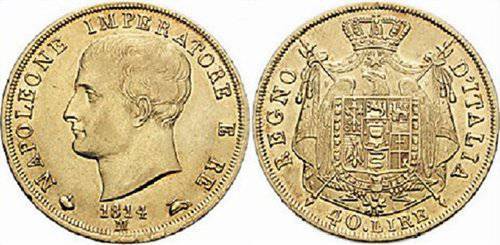
As the Italian king, Napoleon was crowned in the same year 1805 in Milan. He issued very beautiful gold coins worth 40 lire. On the one hand, they wrote "Emperor Napoleon", and on the other - "Kingdom of Italy". He also approved the flag of this state, the colors of which coincide with the banner of the current Italy - green, white and red. It is easy to see that the flag is almost the same as that of France. Just replaced the blue green. So Napoleon gave Italy statehood and the main symbol.
But the first king of Italy could not rule the country permanently. Indeed, at the same time he was also the emperor of France. Therefore, he appointed Yevgeny Beauharnais, the son of his wife, Josephine, from his first marriage as acting head of state with the title of viceroy. Napoleon dreamed of a united Europe, which he, his relatives, and his generals would rule.
Pizza stuff. However, a united Europe failed. It froze in Russian snow exactly seven years later, where the first “Italians” created by the emperor descended. Twenty-seven thousand of them were on the march to Moscow, from where only every twenty-seventh returned - just a thousand of loose-leafed, miraculously survived heroes - the genetic material for the brood breed, which passed the test of natural selection. "It is impossible to deny that Napoleon sympathized with the Italians because of that vague racial kinship, the effect of which was expressed with particular force every time he was in their country, in direct communication with them," wrote in "Stories XIX century "French professors Laviss and Rambo. And how could Napoleon not sympathize with them? After all, he came up with the Italians!
However, the first king of Italy did not deny the existence of other nations on the peninsula. Taking a closer look at the Piedmontese, he decided that it was not the Italians, but the French and added them directly to France - the language of the Piedmontese even today is much more like French than Italian. And in the south he left the Kingdom of Naples, appointing there the king of his friend Murat, the son of a simple innkeeper from under Toulouse. Like, for these mafiosi he will be much more organic than the legitimate King Ferdinand of the Bourbon dynasty. Murat sat on the throne. Ferdinand fled to Sicily, where he had another Sicilian kingdom, where due to lack of fleet, broken under Trafalgar, the emperor's hand could not reach.
Puppet Napoleonic Italy lasted until 1815, when its creator lost the battle of Waterloo and retired to the island of St. Helen. The winners of the "Corsican monster" - Great Britain, Russia, Austria and Prussia - agreed at a congress in Vienna about the structure of the post-war world. In Italy, everything was back to normal - to the position that existed before the invasion of the French troops on the peninsula. Independent states, Parma, Modena, Tuscany, were resurrected again ... Unless the Neapolitan and Sicilian kingdoms merged into one under the rule of the local Bourbons and were renamed the Kingdom of Both Sicilies, and Venice and Lombardy - that is, the territory of the former “Kingdom of Italy”, invented by Napoleon, - appeared under the name of the Lombardo-Venetian Kingdom under the rule of Austria. Vienna appointed its viceroy there - exactly as Napoleon did. Peace and tranquility set in.
Piedmont combinators. Naturally, this world did not like everyone. Many, especially the so-called intelligentsia, began to say that under Napoleon, when "there was Italy," life was freer and better. Each of the independent states on the peninsula in the form of a boot had its own combustible elements. Local governments struggled with them quite effectively. He will raise the next revolutionary “uprising” in some Parma, shout for sight on the square, demanding freedom, and flee abroad. The main "abroad" for these revolutionaries was Piedmont - the Sardinian kingdom - the very one whose inhabitants spoke in a language similar to French. The local king, Victor Emmanuel, decided that it was beneficial to him. So he could terrorize his rivals - all the other Italian monarchs. And who could not accommodate Piedmont, they fled to France. It was there that Giuseppe Mazzini created his organization “Young Italy”, which consisted mainly of his friends. Mazzini published a magazine and demanded one republic instead of a heap of Italian states - as in the times of Ancient Rome.
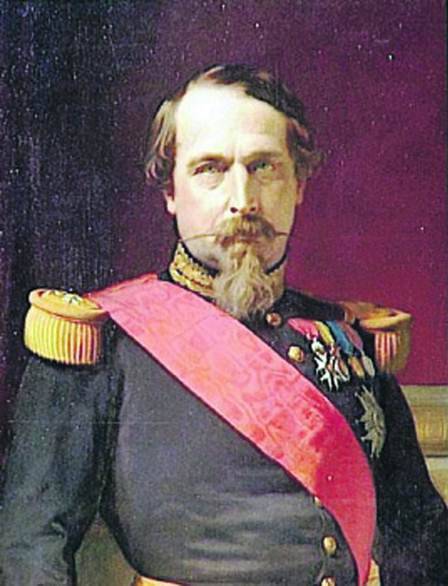
In fact, Italy was at that time a large buffer zone between Austria and France. And here at the Piedmont king wound up a very intelligent Minister Count di Cavour. And in France, Napoleon's nephew, Napoleon III, came to power. As much as he could, the young man tried to imitate his uncle and climbed into a fight on every occasion. The third Napoleon, with his arrogantly muscled mustache and beard, was still drawn to war with Austria and Russia to avenge his former family grievances.
The sly Piedmontese Victor Emmanuel and Cavour decided: why not use the explosive aggressiveness of Napoleon III for their own purposes? We will be “six hands” before France, we will draw her into the war with Austria on our side and again we will create the “Kingdom of Italy” with ourselves at the head. Should a new Napoleon do something good for such wonderful allies?
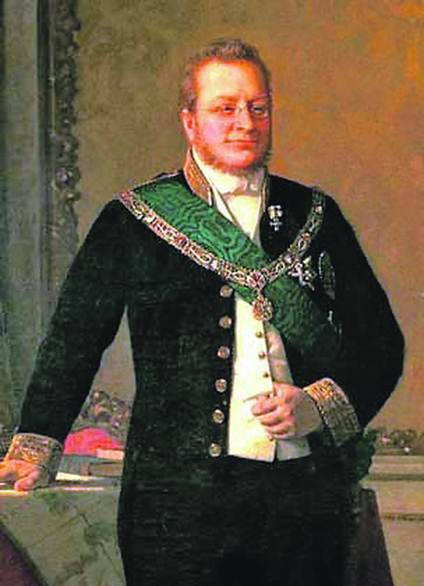
Cavour with Victor Emmanuel was looked at as a business project for the future Italy. If you break all the boundaries in the Italian boot, there it will be possible to shove a hefty piedmont leg. All the treasury, all the taxes that are collected by the king of the two Sicilies, the dukes of Parma and Tuscany, as well as the Pope (and he takes a lot!) Will go to us - smart and progressive leaders.
In order to gain confidence in Napoleon III, two Sardinian swindlers entered the Crimean War. Fifteen thousand corps of the Piedmont troops were freezing for a whole year near Sevastopol - they say they even distinguished themselves in the battle on the Black River. But the initial political capital Cavour and Victor Emmanuel invested profitably. Napoleon was very pleased with their contribution to the overall victory and in response he let himself be drawn into the war against Austria for the “liberation” of Italy.
The national Italian myth says that all Italians dreamed of this freedom. But in reality, the French mostly fought for the future Italy. True, not on the ball. Napoleon III was not a complete fool. Instead of his “disinterested” help to the Italian business, he bargained from the two Piedmontese schemers for Nice and Savoy, who had belonged to Piedmont before. Savoy was the grandfather's legacy of Victor Emmanuel - he belonged to the so-called Savoy dynasty. But the grandfather's estate, spitting on sentiments, gave in return for future benefits - after all, Italy is fifty times more than some Savoy. Well, her bath, this Savoy, along with the late grandfather! In general, the king was very bourgeois — he looked at things realistically.
It turned out a funny situation. Austria fought for the independence of the small Italian states against the insolent Piedmont who protected Napoleon III. And France - for the independence of the future puppet Italy, led by Piedmont. Behind the beautiful words were hidden two rough political calculations of the great powers. The Austrians organized fragmented Italy as a buffer zone between them and France. And the French wanted to weaken Austria and create a friendly new country that would not obey Vienna, but Paris.
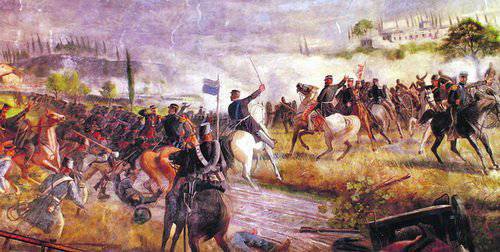
The enemies converged on the plain in Lombardy - under the village of Solferino 24 June 1859. On the one hand - 120 thousands of Austrians. On the other - 25 thousands of Piedmontese and almost 94 thousands of French. Europe has not seen such a battle for a long time. The Austrians were personally commanded by Emperor Franz Joseph, allies by Napoleon and Victor Emmanuel. Troops stretched across the front for five miles. Austrians climbed on the rampage, like devils. But the French, who occupied the dominant heights, repulsed all attacks and launched an offensive. Piedmontese also did not yawn. For the sake of future Italy, friends have done so much meat that even the main “Italophil”, Napoleon III, has become stupid. Immediately after the victory, he made peace with Franz Joseph and left for Paris. It was after this battle that the International Red Cross was invented - that is how the wounded, who had their feet crushed with piths, were so plaintively shouting on the field at Solferino. And since they shouted mostly in French - in the then international language, their cries were heard.
Sicilian tragedy. But as a result of the great French victory, an independent Italy appeared on the world map under the same green-white-red flag that Napoleon Sr. invented for it. The rest was a trick. Tuscan was appointed the state language because Dante spoke it. The fact that Dante was in favor of power over Italy by the German emperor was not disturbed by any of the new Italians - for a long time, in the XIV century, who remembers his political delusions? But the world-famous poet - attach to his glory! Still in Italy they joke that their first foreign language is Italian - at home everyone still speak Sicilian, Venetian, Piedmont.
Victor Emmanuel and his clan destroyed all independent states on the territory of Italy. The Kingdom of the Two Sicilies suffered the most. The standard of living there immediately dropped. The Italian immigrants in America, who are shown in films, are primarily Sicilians, who left the ocean from the happy Italian Risorgimento. The famous mafia - the remnants of the partisan movement against the invaders, the Piedmontese.
The logical result of the unification of Italy was not freedom, but participation in two world wars and Mussolini’s fascism. For any country that is forced to smooth out internal contradictions between the parts from which it is stuck together, goes to a tough domestic and aggressive foreign policy.
There is an expression - the Napoleonic Plan. Modern Italy is one of the most vivid examples of the successful Napoleonic plan. According to the same recipe, all new independent states were created and are being created.
Information